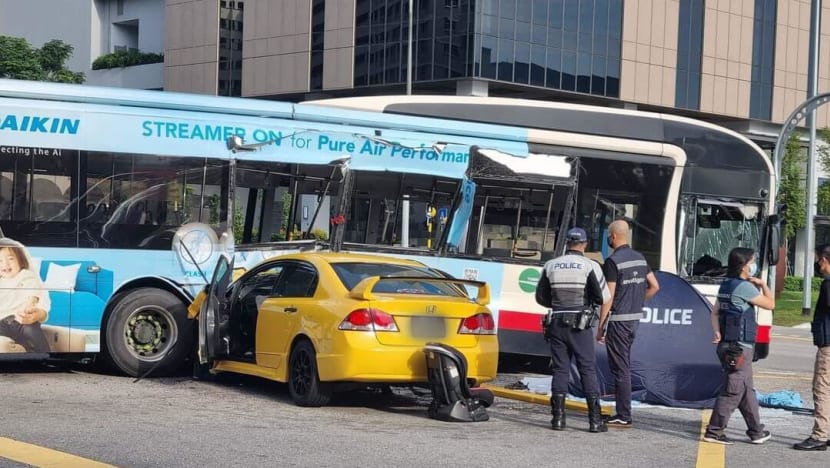Fatal accident involving epilepsy patient raises 'grey areas' around fitness to drive, say doctors
Not all drivers who develop serious health conditions listen to medical advice not to drive, and doctors are concerned about breaching medical confidentiality if they report their patients.

A photo circulating online of a road traffic accident at the junction of Woodlands Avenue 9 and Woodlands Avenue 4 on Sep 1, 2022.
SINGAPORE: On the morning of Sep 1, 2022, Mr Muhammad Hadi Sazali was driving to work when his car ran two red lights and slammed into a bus at a junction along Woodlands Avenue 9.
Mr Hadi, 32, died in the crash. A passenger on the bus, 53-year-old Madam Sariah Bakri, also died later that day of multiple injuries from the collision.
In a coroner’s inquiry into their deaths in March, it emerged that Mr Hadi had a history of epilepsy and had ignored medical advice not to drive.
He experienced his first seizure in December 2014, in his early 20s. During the fit, his wife saw his arms and legs stiffen, his mouth drooling and his eyes rolling.
In a medical follow-up after the seizure in 2015, Mr Hadi was advised not to drive. He was diagnosed with epilepsy and started medication in March 2016.
A seizure is an abnormal electrical discharge of a group of brain cells. Epilepsy is a condition where patients have more than one episode of seizures, or a high risk of recurrent seizures.
Mr Hadi suffered four more epileptic seizures between 2017 and 2022. His last known seizure before his death was in April 2022.
A seizure is a transitory event, and the forensic pathologist who conducted Mr Hadi’s autopsy was unable to conclude whether he was having one at the time of the accident.
While recording an open verdict on Mr Hadi’s death, the coroner noted from medical reports that he had been counselled not to drive on more than one occasion.
“It was highly unfortunate that Mr Hadi had failed to heed the advice of medical professionals who had, in light of his medical history of epilepsy, expressly cautioned him against driving,” she said.
After the coroner’s inquiry, questions were raised about the rules around medical conditions that affect a person’s ability to drive safely, including the duty to notify authorities and stop driving.
When drivers do not notify authorities, doctors face “grey areas” around their duty to report them, said Dr Chong Yeh Woei, the chair of a committee under the Singapore Medical Association (SMA) that is looking at the issue.
This is why SMA – a professional body representing a majority of the nation's healthcare professionals – would support a law making it the driver’s personal responsibility to report any such condition to authorities, Dr Chong told CNA.
But the Singapore Epilepsy Society said that a framework distinguishing between low-risk and high-risk epilepsy patients, the former of which could be allowed to drive, would be useful.
“Certainly public safety is important, but at the same time ... we have to be fair to the individual. Because if we’re draconian, it will be very crushing for them,” said the society’s president Dr Derrick Chan.
RULES ON WHO CAN DRIVE
The legal age to apply for a driving licence in Singapore is 18.
The standard non-vocational driving licence, authorised by the Traffic Police, must be renewed when the driver turns 65. Vocational licences, such as those for taxi drivers, are authorised by the Land Transport Authority and will need to be renewed every three years. For drivers who are 67 years old and above, the validity period of their vocational licence may be shorter.
The rules are stricter for vocational drivers, who are subject to a medical examination at the point of applying for the licence and then at regular intervals from the age of 50.
For non-vocational licences, applicants take an eyesight test and declare that they do not suffer from any disability that could affect their ability to drive safely. From that point until the driver turns 65, there are no compulsory medical examinations, even if drivers develop any medical conditions.
The Road Traffic Act states that a person's driving licence can be revoked if there is reason to believe that they suffer from a condition that could make them a danger to other road users.
According to the SMA, authorities can at any time require a driver to have a medical examination and submit evidence of their continued fitness to hold a licence.
“This is especially so when the authorities receive information of a licensee not being fit to drive,” state SMA's guidelines, which were drawn up by Dr Chong’s committee.
People who suffer from five specific conditions are completely prohibited from driving. These conditions are mental disorder, epilepsy, “sudden attacks of disabling giddiness or fainting”, the inability to read a vehicle licence plate from 25m away, and the inability to distinguish the colours red, amber and green from 25m away.
NOT ALL DRIVERS COMPLY
Despite these rules, drivers do not always notify authorities if they develop medical conditions between the required medical examinations. And they do not always listen to their doctors’ advice not to drive.
In 2017, then-president of SMA Wong Tien Hua wrote to the Ministry of Health (MOH) about this issue. Extracts of the exchange were published on the association’s website.
“While some such patients would voluntarily stop driving following medical advice, others remain in denial, lack sufficient insight to comply or simply refuse outright,” wrote Dr Wong.
Dr Elaine Chua, a family physician at Bedok Medical Centre, told CNA she has advised patients to stop driving on the basis of their safety and the safety of other road users. But this can take some convincing.
“I have managed to convince a patient that if he were to faint while walking, at most he would get scrapes and bruises, but if he were to lose consciousness while driving ... he could be killed,” she said.
“We do not, however, routinely practise informing LTA or Traffic Police about our patients when they are diagnosed with a new condition, as most of these conditions impose a temporary ban.”
Singapore Epilepsy Society’s Dr Chan said doctors will advise the patient that the law does not allow people with epilepsy to drive, and that they need to disclose their diagnosis when applying for a driving licence.
SMA’s Dr Chong, who is a senior consultant physician at the Royal Healthcare Medical Specialist Centre, said doctors do not have many options if patients choose not to take their advice to stop driving.
Patients who have been certified unfit to drive can even seek a second, dissenting opinion to submit to the licensing authority instead, he said.
“The patient shops around for an opinion,” he said, adding that this is “the patient’s prerogative”.
Dr Chan, who is a paediatric neurologist, said some patients who had seizures only in their childhood question why they are not allowed to drive.
People who have a “benign self-limiting form” of epilepsy in childhood often require treatment for a few years, then are seizure-free in adulthood, he said.
“The risk of them having a seizure is probably no higher than you or me,” he said.
PATIENT-DOCTOR CONFIDENTIALITY
When drivers do not notify authorities of their own accord, the duty may fall to their examining doctor to do so. But patient-doctor confidentiality is a core duty of the medical profession.
In response to CNA’s queries, MOH said patients assessed to have medical conditions that could make them unfit to drive “should be clearly instructed by their doctors not to drive”.
“Where patients are known to be non-compliant, healthcare professionals may report their non-compliance and condition to their family members, employers (for vocations that involve driving) and to authorities to ensure public safety.”
SMA’s guidelines on this state that doctors do not have a legal obligation to notify authorities, but “may do so if they feel that a patient, who continues to drive despite their advice, may be a danger on the road”.
In such situations, confidentiality may be breached in the public’s interest, the guidelines say, citing the Singapore Medical Council, a statutory board that governs doctors’ conduct and ethics.
Lawyer Tham Hsu Hsien said a doctor can disclose a patient's medical condition to the authorities if he knows that the condition poses a threat to the patient's or the public's safety.
But the doctor would have to “carefully consider” if he can justify the decision based on the medical facts, the partner at Allen & Gledhill said.
However, the reality is that doctors continue to feel “not protected” under the law if they report their patients, said Dr Chong, adding that to his knowledge, this is untested in the courts and no legal precedent exists.
“There’s never been a case where a doctor reported that the patient was not fit to drive to Traffic Police or LTA, and the patient lodged a complaint against him and action was taken against him,” he said.
“So if a doctor does this, it’s at his own risk.”
In contrast, he pointed to patients with HIV, where the doctor’s duty to disclose the diagnosis to the authorities is clearly “more powerful” than the duty of medical confidentiality.
Lawyer Mr Tham pointed out that HIV is one of the situations where parliament has legislated that a doctor is compelled to disclose confidential medical information.
MAKING IT THE DRIVER’S RESPONSIBILITY
Dr Chong said he believes the “grey areas” could be resolved with a “transportation board” that enforces the laws on fitness to drive. SMA is a non-government organisation that does not have statutory powers, he pointed out.
He said the association would be supportive of a law that makes reporting a medical condition the driver’s personal responsibility.
But Singapore Epilepsy Society’s Dr Chan warned that coming down harder on low-risk epilepsy patients with such a law could cause them to stop consulting their physicians entirely.
He said a framework that stratifies and allows for an “even-handed” assessment between patients who can and cannot drive safely would be useful instead.
A combination of the two is already the case in other jurisdictions. For example, drivers in the United Kingdom have a legal duty to notify the authorities of any injury or illness that could impact their ability to drive safely.
Those with epilepsy can still drive if they have only had seizures while asleep or if they remain fully conscious and were able to move during seizures. They can also reapply for a licence after a minimum period of not experiencing any seizures.
Drivers can be fined up to £1,000 (US$1,250) for not reporting their condition. They can also be prosecuted if they get into an accident.
If a patient cannot or will not notify the authorities themselves, doctors and other healthcare professionals should make the notification instead.
Australia also has laws requiring drivers with medical conditions that affect their driving ability to inform authorities or face a fine. These conditions include hearing loss and deafness, depression and schizophrenia, and substance misuse.
Only South Australia and the Northern Territory have a mandatory reporting requirement for medical practitioners.
Editor's note:
An earlier version of this article said that vocational licences must be renewed when a driver turns 50. This is incorrect. Vocational licences need to be renewed every three years and the validity period of the licence may be shorter for drivers who are 67 years old and above. We are sorry for the error.


















